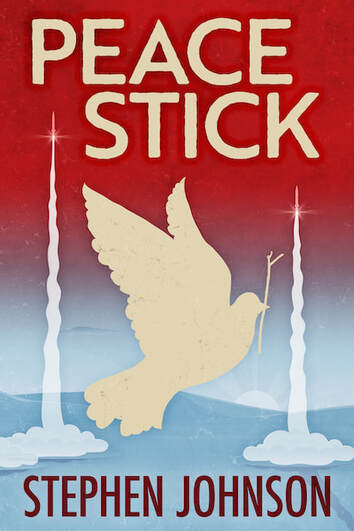
by Stephen Johnson
This story is thought-provoking in several ways, not the least of them being the fact that it opens at the time when the ‘White Knight’ of postwar politics, John F Kennedy, is becoming accustomed to the taste of humble pie. Since Kennedy’s inauguration in January 1962, the Eastern bloc led by the wily Nikita Kruschev had seized the limelight and all the prizes in international politics through Yuri Gagarin’s triumphant spaceflight, the Bay of Pigs disaster and the overnight erection of the Berlin Wall. These events admirably set the tone for a period when Russia in general, and the German Democratic Republic, in particular, seemed to own all the aces and most of the answers in the struggle between capitalism and communism.
Stephen Johnson uses these events to create a world-view that is unassailably communist, but he does it without ever stooping to the lecture. Johnson’s use of the ‘show, don’t tell’ writer’s maxim is little short of brilliant, and he does it through the medium of two East German teenage schoolgirls living through the Cuban Missile Crisis of the following year. 1962 was a year when Kennedy could not afford to drop another match in front of the American public, and this imperative throbs through the story like the bass line in a musical score, underpinning the tension as Eastern and Western blocs move towards a confrontation that neither side will win in any sense.
Heavy stuff indeed, but the author presents it through the childish eyes of two just-teenaged girls who fasten upon a humble piece of the natural world—a small branch—and endow it, in their minds, with prophetic powers to avert nuclear war over Cuba as long as the stick remains where they hide it, to work its magic in secret. In this way the girls pin their hopes and dreams of a future firmly (and completely credibly) on the talismanic ‘glücksbringer’.
Johnson sets his pictures of the superstitions of these teenagers against the monochrome background of the totalitarian state. He sketches a world in which the secret police, the dreaded ‘Stasi’, are all-powerful; in which police ‘suspects’ are routinely beaten up for real or imagined infractions of the state’s rules or preferences; a world in which school students begin their day by springing to attention and saluting; a world in which authoritarian mores pervade society so that younger schoolchildren may not contradict older ones, and a world that has apparently never moved on from the doctrinaire processes of the Third Reich.
Socially, Ingrid and Sylvie live in a world split between East and West, and Johnson masterfully suggests, without ever making it explicit, that citizens of the Workers’ Paradise would gratefully inhabit the decadent West if only they could. In that context, both opening and conclusion indicate that the girls realised their potential after the Wall came down. Given that Ingrid’s parents played a prominent part in their daughters’ formative years, it would have been nice to know what became of them in the years between the Crisis and the tumbling of the Wall.
But none of that detracts from Stephen Johnson’s superbly-written story. The author is clearly at ease with the thought-processes of teenagers, and his depiction of Ingrid and Sylvie as two ordinary, non-rebellious, non-problematic, hopeful, loving and ‘ordinary kids’ living through a defining moment of the twentieth century is as accurate as it is reassuring.
And anyone interested in more recent defining moments really ought to read the concluding sentence of this outstanding work . . . .
Author: Stephen Johnson
Publisher: Stephen Johnson
ISBN: 978-0-473-63801-6
RRP: $25
Available: Wheelers, Paper Plus, Time Out Bookstore, Unity Books, The Little Book Shop, Poppies Howick, Wardini Books, Writers Plot Bookshop, Good Books, Scorpio Books. Amazon: eBook and paperback.

 RSS Feed
RSS Feed
